成教版英语一 Unit 8
英语综合教程1unit8

英语综合教程1unit8Unit 8: The Human BodyIn Unit 8 of the comprehensive English tutorial, we will explore the fascinating topic of the human body. The human body is a complex and remarkable organism consisting of various systems that work in harmony to facilitate our everyday functions. We will delve into the main systems of the body, including the digestive, respiratory, circulatory, and nervous systems, and discuss how they function and interact with one another.To begin, the digestive system plays a crucial role in extracting essential nutrients from the food we consume. It consists of organs such as the mouth, esophagus, stomach, and intestines, which work together to breakdown and absorb the nutrients from the food. The process starts in the mouth, where food is broken down by enzymes and chewed before being swallowed. Then, it travels through the esophagus into the stomach, where stomach acid aidsin the further breakdown of food. The food then moves into the small intestine, where nutrients are absorbed into the bloodstream, and waste products move into the large intestine for elimination. Moving on to the respiratory system, it is responsible for the exchange of oxygen and carbon dioxide between the body and the environment. The main organ of the respiratory system is the lungs, which carry out the crucial function of oxygenating the blood. When we inhale, air enters the nasal cavity and travels down the windpipe into the lungs. In the lungs, oxygen is absorbed into the bloodstream, and carbon dioxide, a waste product, is expelled when we exhale. The respiratory system's efficient functioning isvital for our survival and overall health.The circulatory system, also known as the cardiovascular system, is responsible for transporting oxygen, nutrients, hormones, and waste products throughout the body. It consists of the heart, blood vessels, and blood. The heart, a muscular organ located slightly to the left of the chest, pumps blood to all parts of the body through a network of blood vessels. The oxygenated blood is circulated to various organs and tissues, providing them with the necessary nutrients and oxygen. Simultaneously, waste products, such as carbon dioxide, are collected and transported back to the lungs for removal. The circulatory system's consistent flow of blood ensures the proper functioning of all body systems.Lastly, we will look at the nervous system, which coordinates and controls all body activities. The nervous system consists of the brain, spinal cord, and peripheral nerves. The brain acts as the control center, receiving and interpreting information from sensory organs and sending appropriate signals to different parts of the body. The spinal cord serves as a communication pathway between the brain and the peripheral nerves, which branch out to various body parts. The nervous system regulates important bodily processes like movement, sensation, and thinking, enabling us to respond and adapt to our environment.In conclusion, the human body is an intricate system of systems, each playing a vital role in sustaining life. The digestive system breaks down and absorbs nutrients, the respiratory system ensures oxygenation and carbon dioxide elimination, the circulatory system transports essential substances, and the nervous system coordinatesand controls body activities. Understanding the functions and interactions of these systems allows us to appreciate the amazing complexity of the human body and the importance of maintaining its health.。
大学英语精读第一册第三版 unit8 课文英汉翻译资料

The boy was at first delighted to discover the present his mother had hidden away as his Christmas gift. But then he began to worry that his mother would now no longer have the pleasure of giving him a surprise. What was he to do?发现了母亲为他藏好的圣诞礼物男孩起先很高兴。
但接着他就开始担心,妈妈将因此失去给他一个惊喜的喜悦。
他该怎么办呢?Magician at Stretching a Dollar Russell Baker 1RT That December, with Christmas approaching, she was out at work and Doris was in the kitchen when I let myself into her bedroom one afternoon in search of a safety pin. Since her bedroom opened onto a community hallway, she kept the door locked, but needing the pin, I took the key from its hiding place, unlocked the door and stepped in. Standing against the wall was a big, black bicycle with balloon tires. I recognized it instantly. It was the same second-hand bike I'd been admiring in a Baltimore Street shop window. I'd even asked about the price. It was a shock. Something like $15. Somehow my mother had scraped together enough for a down payment and meant to surprise me with the bicycle on Christmas morning.那年的十二月,圣诞节临近了。
成教英语book1,unit8 A篇词汇,短语,句子,及课文翻译
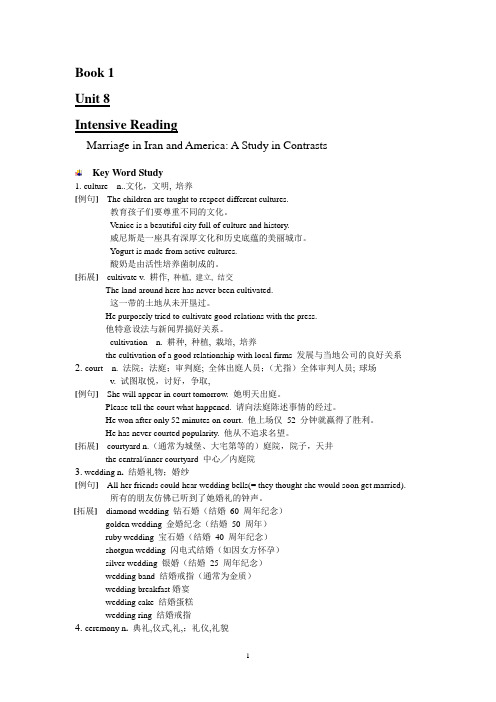
Book 1Unit 8Intensive ReadingMarriage in Iran and America: A Study in ContrastsKey W ord Study1. culture n..文化,文明,培养[例句]The children are taught to respect different cultures.教育孩子们要尊重不同的文化。
V enice is a beautiful city full of culture and history.威尼斯是一座具有深厚文化和历史底蕴的美丽城市。
Y ogurt is made from active cultures.酸奶是由活性培养菌制成的。
[拓展]cultivate v. 耕作,种植, 建立, 结交The land around here has never been cultivated.这一带的土地从未开垦过。
He purposely tried to cultivate good relations with the press.他特意设法与新闻界搞好关系。
cultivation n. 耕种, 种植, 栽培, 培养the cultivation of a good relationship with local firms 发展与当地公司的良好关系2. court n. 法院;法庭;审判庭; 全体出庭人员;(尤指)全体审判人员;球场v. 试图取悦,讨好,争取,[例句]She will appear in court tomorrow. 她明天出庭。
Please tell the court what happened. 请向法庭陈述事情的经过。
He won after only 52 minutes on court. 他上场仅52 分钟就赢得了胜利。
He has never courted popularity. 他从不追求名望。
(全新版)大学英语《综合教程》第一册Unit8

• Language Study
• 1. run out of: use up or finish a supply of (sth.) • Examples: 1) To our disappointment, our car ran out of gas halfway home. • 2) When they ran out of food, the soldiers set about hunting for more. • 2. handful: a small number (used as singular noun, followed by of) • Examples: 1) You'd better hurry up. A handful of people are already waiting in the hall. • 2) I have to give up the plan because only a handful of students are willing to spend the New Year's Eve on campus. • 3. in amazement: with a feeling of great surprise or disbelief • Examples: 1) Aunt Sophia gazed at her picture in amazement: she looked like a teenage girl in it. • 2) All the people in the lecture hall stared at him in amazement when he talked loudly with his friend.
大学英语综合教程 1 unit8-课件
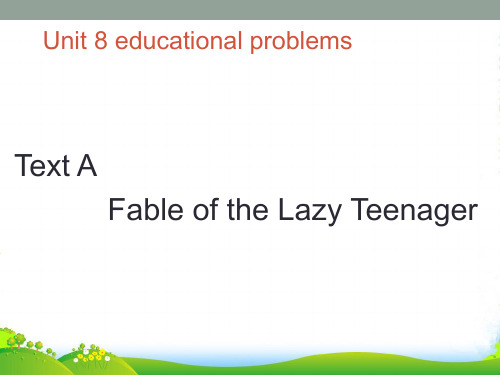
Directions: 1. Work in groups 2. Rebuild the fables according to the pictures and key words 3. Select a presenter for your group 4. Tell your fable to the class and the moral lesson
Picture Fable Talking
Never trust a flatter.
Picture Fable Talking
Picture Fable Talking
The Milkmaid and Her Pail A milkmaid was going to the market. She carried her milk in a pail on her head. She dreamt about the eggs she would buy when she sold the milk. The eggs will hatch; then she will sell the chickens. With the money she earned, she would buy fine clothes for herself. “ I’ll buy a new dress, and when I go to the ball, all the young men will dance with me!” As she spoke she tossed her head back. The pail immediately fell off her head, and all the milk was spilt. The girl went back without anything. She felt very sad. "ah, my child," said her mother. “Do not count your chickens before they are hatched."
全新版大学英语综合教程1课文翻译(Unit1-Unit8)
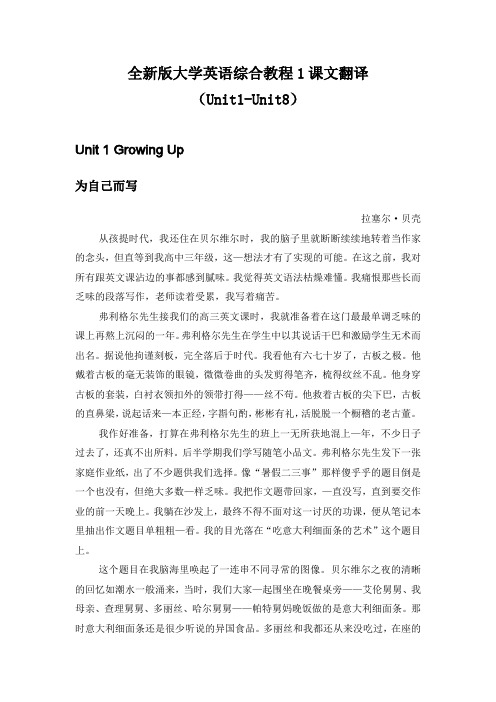
全新版大学英语综合教程1课文翻译(Unit1-Unit8)Unit 1 Growing Up为自己而写拉塞尔·贝壳从孩提时代,我还住在贝尔维尔时,我的脑子里就断断续续地转着当作家的念头,但直等到我高中三年级,这—想法才有了实现的可能。
在这之前,我对所有跟英文课沾边的事都感到腻味。
我觉得英文语法枯燥难懂。
我痛恨那些长而乏味的段落写作,老师读着受累,我写着痛苦。
弗利格尔先生接我们的高三英文课时,我就准备着在这门最最单调乏味的课上再熬上沉闷的一年。
弗利格尔先生在学生中以其说话干巴和激励学生无术而出名。
据说他拘谨刻板,完全落后于时代。
我看他有六七十岁了,古板之极。
他戴着古板的毫无装饰的眼镜,微微卷曲的头发剪得笔齐,梳得纹丝不乱。
他身穿古板的套装,白衬衣领扣外的领带打得——丝不苟。
他救着古板的尖下巴,古板的直鼻梁,说起话来—本正经,字斟句酌,彬彬有礼,活脱脱一个橱稽的老古董。
我作好准备,打算在弗利格尔先生的班上一无所获地混上—年,不少日子过去了,还真不出所料。
后半学期我们学写随笔小品文。
弗利格尔先生发下一张家庭作业纸,出了不少题供我们选择。
像“暑假二三事”那样傻乎乎的题目倒是一个也没有,但绝大多数—样乏味。
我把作文题带回家,—直没写,直到要交作业的前一天晚上。
我躺在沙发上,最终不得不面对这一讨厌的功课,便从笔记本里抽出作文题目单粗粗—看。
我的目光落在“吃意大利细面条的艺术”这个题目上。
这个题目在我脑海里唤起了一连串不同寻常的图像。
贝尔维尔之夜的清晰的回忆如潮水一般涌来,当时,我们大家—起围坐在晚餐桌旁——艾伦舅舅、我母亲、查理舅舅、多丽丝、哈尔舅舅——帕特舅妈晚饭做的是意大利细面条。
那时意大利细面条还是很少听说的异国食品。
多丽丝和我都还从来没吃过,在座的大人也是经验不足,没有—个吃起来得心应手的。
艾伦舅舅家诙谐有趣的场景全都重现在我的脑海中,我回想起来,当晚我们笑作—团,争论着该如何地把面条从盘子上送到嘴里才算合乎礼仪。
大学英语教材第一册unite8
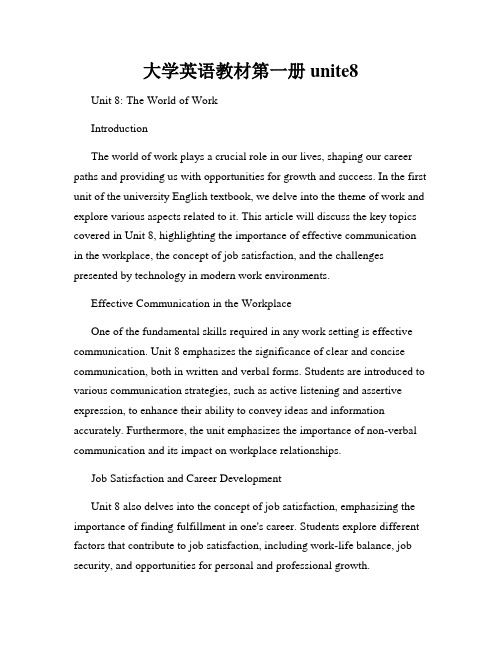
大学英语教材第一册unite8Unit 8: The World of WorkIntroductionThe world of work plays a crucial role in our lives, shaping our career paths and providing us with opportunities for growth and success. In the first unit of the university English textbook, we delve into the theme of work and explore various aspects related to it. This article will discuss the key topics covered in Unit 8, highlighting the importance of effective communication in the workplace, the concept of job satisfaction, and the challenges presented by technology in modern work environments.Effective Communication in the WorkplaceOne of the fundamental skills required in any work setting is effective communication. Unit 8 emphasizes the significance of clear and concise communication, both in written and verbal forms. Students are introduced to various communication strategies, such as active listening and assertive expression, to enhance their ability to convey ideas and information accurately. Furthermore, the unit emphasizes the importance of non-verbal communication and its impact on workplace relationships.Job Satisfaction and Career DevelopmentUnit 8 also delves into the concept of job satisfaction, emphasizing the importance of finding fulfillment in one's career. Students explore different factors that contribute to job satisfaction, including work-life balance, job security, and opportunities for personal and professional growth.Additionally, the unit encourages students to reflect on their own career goals and aspirations, facilitating the development of a proactive approach towards career planning and decision-making.Challenges of Technology in the WorkplaceIn today's digital age, technology has become an integral part of the modern workplace. Unit 8 addresses the challenges presented by technology and highlights the need for individuals to adapt and acquire digital skills. Students are exposed to topics such as online collaboration, virtual meetings, and digital etiquette. The unit also explores the potential benefits and drawbacks of technology in the workplace, encouraging students to critically analyze its impact on productivity and overall work environment.Practical Application: Case Studies and ActivitiesUnit 8 incorporates various practical activities and case studies to enhance students' understanding and application of the topics discussed. These activities simulate real-life scenarios, allowing students to practice their communication skills, engage in critical thinking, and develop problem-solving abilities. By engaging in these activities, students are better equipped to handle workplace challenges and communicate effectively with colleagues and superiors.ConclusionUnit 8 of the university English textbook delves into the world of work, highlighting the importance of effective communication, job satisfaction, and technology in the workplace. By studying these topics, students develop essential skills and knowledge necessary to thrive in their future careers.Through practical application and thoughtful reflection, individuals are empowered to navigate the complexities of the modern work environment, setting the foundation for success and fulfillment.。
大学英语精读第一册Unit 8课件
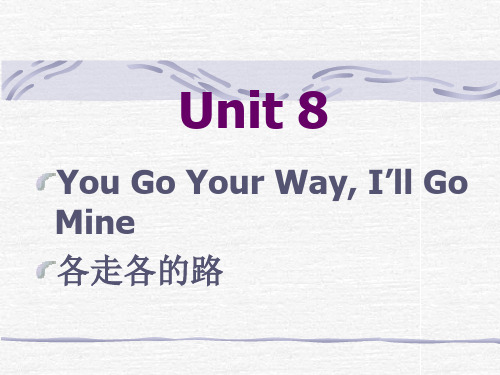
4. hear of: hear about 听到, 听说
e.g. As soon as I heard of his arrival I hastened to meet him. Have you ever heard of a poet by the name of Prior? The librarian had never heard of the book I wanted.
Compare:
extend v. 可引伸为“扩展(势力\范围 )”, 原意是直线状的伸展 expand v. 扩大,扩张,指面或体的伸展 spread v. 传播,散布(消息\疾病等) stretch v. 伸手;撑大,涨大,拉长, 指由曲 而直或由短而长的伸展
注: 领土, 势力, 或计划不能用spread 或 stretch.
when they leave. Professor Smith is a most
learned scholar, I should say.
2. eager a. full of strong wish 热切的,渴望的
e.g. Soldiers are eager for any neWay, I’ll Go Mine 各走各的路
I. Word Study and Word Building
1. tragic a. 悲惨的;悲剧的
e.g. The audience wept over the heroine’s tragic fate. Pan Hong is known as a tragic actress. It was a tragic mistake for Othello to kill his wife out of jealousy.
成人版一册+Unit+8+教师版

成人版一册+Unit+8+教师版Unit 8Your passports, please.Grammar【名称】名词变复数(规则变化)【规则】绝大多数的可数名词的复数形式,是在该词末尾加上-s。
E.g. book—books bag—bags pen—pens【不规则】1. 以-s,-x,-ch,-sh结尾的名词后面加-es构成复数形式。
E.g. class—classes bus—buses fox—foxeswish—wishes match—matches bench—benches2. 以辅音字母加-y结尾的名词,改y为ies,变成复数形式。
E.g. fly—flies city—cities lady—ladiesbelly—bellies duty—duties jury—juries3. 以f或fe结尾的名词,一般将f或fe变为v,再加上-es,变为复数形式。
E.g. life—lives leaf—leaves wife—wivesknife—knives thief—thieves hoof—hooves4. 以辅音字母o结尾的名词,一般在后面加-es构成复数形式。
E.g. potato—potatoes tomato—tomatoes hero—heroesnegro—Negroes echo—echoes【常用词汇复数】is、am—are this—these that—thoseE.g.单数复数例句Book BooksThese are my books. 这些是我的书。
Lady LadiesThese ladies are my friends. 这些女士是我的朋友。
Bus BusesThere are 5 buses in our town. 在我们镇上有5辆公交车。
ⅠWrite down the plural forms.1. fox ________2. brush ________3. stomach ________4. knife ________5. Negro ________6. path ________7. Chinese ________8. Englishman ________9. Japanese ________ 10. Frenchman_______ 11. German ________ 12. foot ________ 13. child ________ 14. story ________ 15. goose ________ 16. family ________ 17. waitress ________ 答案1. foxes2. Brushes3. Stomachs4. Knives5. Negroes6. Paths7. Chinese8. Englishmen9. Japanese 10. Frenchmen 11. Germans 12. feet 13. children 14. Stories 15. geese 16. families 17. waitressesⅡ Multiple choice.1. A: Are ________ Danish? B: Yes, they are.A. this girlB. these boysC. youD. your teacher 2. A: What are those? B: ________.A. It’s a red bookB. This are black umbrellasC. These is a carD. They are dogs 3.The carpet ________ my ________ is brown.A. under, footB. under, footsC. in, feetD. under, feet 答案 1.B解析:此题考查名词复数变化,答句中“they”表明针对第三人称复数提问,则只有“these boys”符合条件,故答案为B 。
人文英语1unit8参考答案

人文英语1unit8参考答案人文英语1 Unit 8 参考答案Unit 8: Cultural HeritageSection A: Vocabulary and Grammar1. Multiple Choice Questions- (1) The correct answer is C. "Preservation" as it refers to the act of keeping something in its original state.- (2) The answer is B. "Cultural heritage" is the term used to describe the legacy of physical artifacts and intangible attributes of a group or society that areinherited from past generations, maintained in the present, and bestowed for the benefit of future generations.- (3) The correct answer is A. "Destruction" is the act of causing something to be demolished or ruined.2. Fill in the Blanks- (1) The ancient city has been well preserved for centuries.- (2) The cultural heritage of the region is rich and diverse.- (3) The war led to the destruction of many historical sites.3. Error Correction- (1) The sentence should read: "The preservation ofcultural heritage is crucial for maintaining our identity." - (2) The corrected sentence is: "The destruction of historical monuments is a great loss to humanity."- (3) The error should be corrected to: "The cultural heritage site was restored to its original state."Section B: Reading Comprehension1. True or False Questions- (1) True. The article states that cultural heritage is an important part of our identity.- (2) False. The article mentions that cultural heritageis not only about physical artifacts but also includes intangible aspects.- (3) True. The article discusses the importance of preserving cultural heritage for future generations.2. Comprehension Questions- (1) The main idea of the passage is the significance of preserving cultural heritage and the various forms it can take.- (2) The passage mentions that cultural heritage includes both tangible and intangible elements.- (3) The article suggests that the preservation of cultural heritage is essential for maintaining a connection with the past and for the identity of a society.Section C: Writing Task1. Sample EssayThe preservation of cultural heritage is a critical aspectof our society. It serves as a bridge connecting the past, present, and future. Cultural heritage encompasses a wide range of elements, from historical buildings and artifacts to traditional practices and languages. It is our responsibility to protect and maintain these treasures for the benefit of future generations.To begin with, cultural heritage provides a sense of continuity and identity. It helps individuals understandtheir roots and the evolution of their society. Furthermore, it fosters a sense of pride and belonging among the members of a community.Additionally, cultural heritage is a valuable resource for education and research. It offers insights into the history, art, and social structures of different periods. This knowledge can be used to inform current practices and inspire new ideas.However, cultural heritage is under constant threat from various factors such as urban development, natural disasters, and even political conflicts. It is crucial that we take proactive measures to safeguard these invaluable resources. This can be achieved through legal protections, public awareness campaigns, and international cooperation.In conclusion, the preservation of cultural heritage is not just a matter of sentimentality; it is a vital component of our collective memory and identity. By taking steps to protect and cherish our cultural heritage, we ensure that future generations can continue to learn from and appreciatethe rich tapestry of human history.Section D: Discussion Questions1. Discuss the importance of preserving cultural heritage and how it can contribute to a society's identity.2. What are some of the challenges faced in preservingcultural heritage, and how can they be addressed?3. How can technology be used to assist in the preservation and promotion of cultural heritage?This set of answers provides a comprehensive review of Unit 8, covering vocabulary, grammar, reading comprehension, writing, and discussion topics related to cultural heritage.。
全新版大学英语第一册Unit 8 Menu
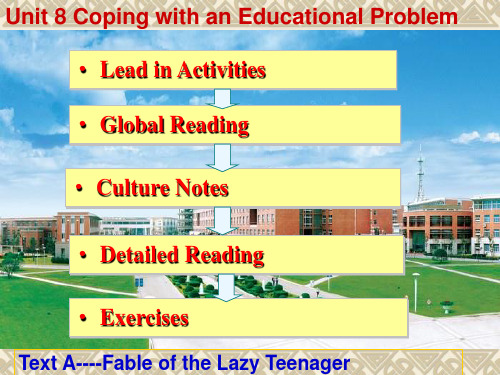
Text A----Fable of the Lazy Teenager
Unit 8 Coping with an Educational Problem
2. in amazement: with a feeling of great surprise or disbelief
She stared in amazement.
Kevin 1945 grandfather Kevin 1966 Father Kevin 1990 himself Kevin 2020 Son
Kevin 2050 grandson
Text A----Fable of the Lazy Teenager
Unit 8 Coping with an Educational Problem 8. What does the fable convey to us? 9. What is the use of education? 10. What can make Japanese rise from the ashes after they were defeated? 11. Why does Kevin 1990 decide to study instead of going shopping?
Part 2
para1124
Text A----Fable of the Lazy Teenager
Unit 8 Coping with an Educational Problem
U.C.L.A The Wealth of Nations
Text A----Fable of the Lazy Teenager
Text A----Fable of the Lazy Teenager
大学英语教程1读写译 UNIT 8

UNIT EIGHT
KEY WORDS MADE EASY A Read aloud the following sentences and figure out what each italicized word means. The clue in the parentheses will help. 5. Irving Howe was a veteran American writer. (experienced) 6. Business, as an academic pursuit, develops rapidly throughout the world. (scholarly) 7. The booming business has improved people’s living standard. (rising) 8. From a scientific point of view, nobody is immortal. (living forever) 9. After graduation many students go to banking for an adequate income. (satisfactory) 10. Some people prefer steady work though the pay for such work may be low. (unchanging) BACK
Part I LANGUAGE SKILL
KEY WORDS MADE EASY
KEY EXPRESSIONS IN USE
BACK
UNIT EIGHT
KEY WORDS MADE EASY
A Read aloud the following sentences and figure out what each italicized word means. The clue in the parentheses will help. 1. The education cost of this university exceeds that of the average American universities. (goes beyond) 2. The annual income of his family mainly goes to the daily spending. (yearly) 3. We’re going to have to make the world a little more habitable for human beings. (livable) 4. He is always puzzled by such ultimate question as what the meaning of life is. (essential) BACK
综合英语一上册第八课lesson-eight

Lesson eightA fiddle and the lawFiddle (口语)小提琴Fiddle (口语)(用小提琴)演奏Fiddler (口语) 小提琴手Special agent 特工Cabin 小屋,小木屋Get 收获,捕获Armed 武装的,持枪的Killer 杀人犯,杀手Broken 被打碎了的Closely 严密地,仔细地Government man (美国)联邦调查局特工Agent (政府机关的)特工Draw 吸(气),吸入Step 跨步,迈步Cheerful 快活的,兴高采烈的Fireplace 壁炉Silently 无声地,沉默地Silence 寂静,无言,沉默Bearded 有胡须的Pa (口语)爸爸Assign 分配,指定,选派Violin 小提琴Play 演奏Part 地区,部分Deeply 极大地,深刻地Impress 给人留下深刻印象Instrument 乐器,仪器Aim 瞄准,对准Sweat 汗,汗水Forehead 额头,脑门Calmly 镇定地,冷静地Welcome 受欢迎的Carefully 仔细地,谨慎地Bow 琴弓Unmoved 无动于衷的Alert 警惕的,警觉的Tune 曲调,歌曲String 琴弦Sweet 悦耳的,旋律优美的Note 音,调子Folk 民间的,通俗的Glorious (口语)非常愉快的Enchant 使….着迷,迷倒…..Defiance 违抗,藐视First-class 第一流的Sunshine 阳光Once 一次Once more 再一次Dance 跳动,轻快地移动Quickly 快速地,迅速地Eye 盯着,凝视Want 通缉(犯人)Amusement 兴趣;娱乐Worse off (情况)更糟糕的,跟贫困的Guy (美,口语)男人(guys 家伙,包括女人) Nearby 在附近的Log 木柴Deep 专心的,全身贯注的Decent 正派的Thick (嗓音等)不清楚的,沙哑的Sheriff (美国的)县治安官So long (美,口语)再见Relief (忧虑解除后的)轻松Appearance 外表,外貌Hiding 隐藏,躲藏in hiding 在隐藏中useful expressionsdraw a (deep) breath (深)吸一口气point at 指着look around 环顾四周be assigned to do 被指派做某事catch sight of 看见speak up 大声说aim at 瞄准beat time 打拍子break into 突然….起来one after another 一个接一个glance at 一瞥,看一眼be filled with 充满stay for dinner 留下来吃饭speak of 提及,说起be deep in thought 沉思give oneself up to 向…..自首give way to 让路, 为…..所代替After the explanation, his doubts gave way to belief.Die away 逐渐消失The wind died away and it began to rainAs if 似乎He spoke as if he were the prince himself.Translate1)别紧张,深吸一口气Don’t be nervous. Draw a deep breath.2)在有些国家,说话时用手指指人是不礼貌的In some countries, it is impolite to point toward people with fingers.3)大学毕业后,我爸爸被分配到西北工作My father was assigned to work in Northern_west China when he graduated from college.4)我从窗户向外看去,看见了一列疾驰而过的火车I caught sight of a train passing by when I looked through the window.5)当他听到这个笑话时,顿时大笑起来He broke into laughter when he heard the joke.6)打字机已经被计算机所取代.Typewriters have given way to computers.7)你又没别的事,留下来吃饭吧Stay for dinner since you have nothing to do.8)噪杂声渐渐消失了Noises died away9)他继续拉琴,好像什么事也没有发生He went on playing the violin as if nothing had happened.10)我的朋友多次说起你My friend has spoken of you many times.Questions on the text1)Where did agent X go one day? What for?Special Agent X went to a cabin about two miles up the mountain. He had come to get Cal Richards, an armed and dangerous killer.2)Who was the bearded man? Did he know what Agent X had come for? What was he ready todo?The bearded man was Cal Richards’ father, Pappy Richards was knew what Agent X had come for. He was ready to shoot with his gun.3)What did agent X say when he found that Cal Richards was not in the cabin?Agent X said, “I’ve been assigned to do it. But I can see he isn’t here today. I guess I’ll have to come again.”4)What did he do when he saw the violin? Was he nervous when he took the violin from thewall? How do you know? Did he appear nervous?He caught sight of the violin hanging on the wall. He asked, “Who plays the fiddle?” Then, he crossed the room to take the violin. He was nervous. He knew that the gun was still aimed at him. He felt sweat on his forehead. But he did not appear nervous. He took the violin from the wall as calmly as if he were a welcome visitor.5)What did Pappy’s friend begin to do when Agent X began to play the violin? What aboutpappy?Pappy’s friend, the old man, began to beat time, tapping one foot on the dirt floor. But Pappy stood unmoved , gun in hand and eyes alert.6)What did Pappy do when Agent X began to play an old American folk song?Pappy stood enchanted, the defiance in his eyes giving way to a look of wonder. The gun was now pointed toward the floor. When the final notes of the song died away, Pappy placed the gun in a corner.7)Why did Pappy invite Agent X to stay for dinner? How did the agent become a welcomeguest?The agent now became a welcome guest because he played music for them. Pappy thought Agent X had first-class fiddling. He invited Agent X to stay for dinner and asked him to play some more for them.8)Did the agent stay at the cabin for a long time? What did the three men do all the time? DidAgent X forget about his job?Yes. The agent stayed at the cabin for a long time. The three men talked and not once did anyone speak of the reason for the G_man’s visit. Once more the bow danced across the strings. But Agent X didn’t forget about his job.9)What questions did pappy’s friend ask when the agent was saying good-bye?Pappy’s friend eyed him for a moment and said, “how about Cal? You want him, don’t you?”10)How did the agent answer them?The G_man smiled, “I don’t want him. The government wants him, and you know it is when the government wants a msn. It may take days or months or years to get him, but they’ll get him. Ant the longer it takes, the worse off he is.”11)What did Pappy decide to do? Why? Did he do as he had promised?Pappy decided to have a talk with Cal and thought he might give himself up.12)What do you think of Agent X’s way of getting the dangerous killer?I think the G_man was very clever. He could get the killer without fighting. But on the other hand, it was too dangerous. That’s why the G_man was nervous.。
大学英语全新版第一册第八单元答案

BOOK 1 - Unit 8 - Language Focus - Vocabulary
11) When you look at the state of his car it's a [miracle] that he wasn't killed!
12) A week before the Spring Festival the telephone exchange [was jammed] with people wanting to book train tickets.
BOOK 1 - Unit 8 - Language Focus - Words with Multiple 5. story, interesting reading Meanings [The story makes interesting reading.]
6. five, and, five, ten [Five and five make ten.]
2) I couldn't care less whether you stay or leave. (indifference) Whether you stay or leave[is a matter of total indifference to me].
3) The personnel manager of the company explained very clearly that they needed extra people. (drive home) The personnel manager of the company[drove home the point that they needed extra people].
成教英语book1,unit8 B篇词汇,短语,句子,及课文翻译
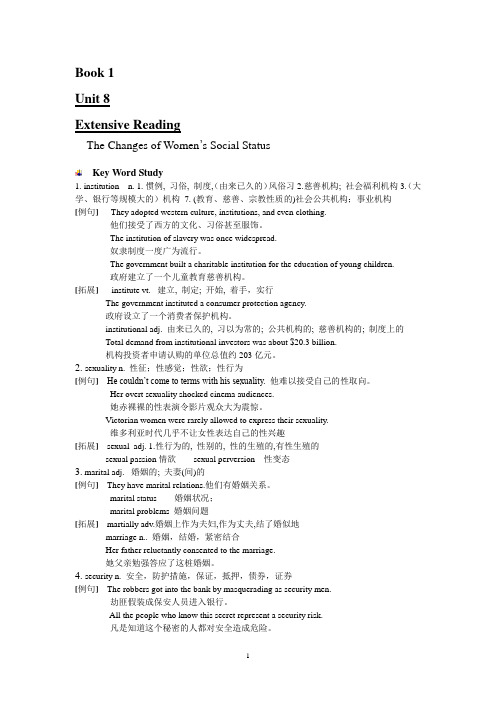
Book 1Unit 8Extensive ReadingThe Changes of Women’s Social StatusKey Word Study1. institution n. 1. 惯例, 习俗, 制度,(由来已久的)风俗习2.慈善机构; 社会福利机构3.(大学、银行等规模大的)机构7. (教育、慈善、宗教性质的)社会公共机构;事业机构[例句]They adopted western culture, institutions, and even clothing.他们接受了西方的文化、习俗甚至服饰。
The institution of slavery was once widespread.奴隶制度一度广为流行。
The government built a charitable institution for the education of young children.政府建立了一个儿童教育慈善机构。
[拓展]institute vt. 建立, 制定; 开始, 着手,实行The government instituted a consumer protection agency.政府设立了一个消费者保护机构。
institutional adj. 由来已久的, 习以为常的; 公共机构的; 慈善机构的; 制度上的Total demand from institutional investors was about $20.3 billion.机构投资者申请认购的单位总值约203亿元。
2. sexuality n.性征;性感觉;性欲;性行为[例句]He couldn’t come to terms with his sexuality.他难以接受自己的性取向。
Her overt sexuality shocked cinema audiences.她赤裸裸的性表演令影片观众大为震惊。
新英语教程第一册 unit 8

a. n. v. a. n. a. n. a. vt. n./vt. a.
abandon vt. verify vt. dominant a. mature a. experimental a. exhibit vt./n. withdraw v. contact n./vi. chase vt./n. urban a. disorder n.
Part A: Overpopulation and Social Behavior
8
New English Course (Book One)
III The dominant males in the rat population were the least affected by overpopulation. Each of these strong males claimed an area of the enclosure as his own. Therefore, these individuals did not experience the overcrowding in the same way as the other rats did. The fact that the dominant males had adequate space in which to live may explain why they were not as seriously affected by overpopulation as the other rats. However, dominant males did behave pathologically at times. Their antisocial behavior consisted of attacks on weaker male, female, and immature rats.
大学英语精读:第一册UNIT8

A young boy faces the impossible task of trying to soften the blow of tragic mews.You Go Your Way, I'll Go Mine The messenger got off his bicycle in front of the house of Mrs. Rosa Sandoval. He went to the door and knocked gently. He knew almost immediately that someone was inside the house. He could not hear anything, but he was sure the knock was bringing someone to the door and he was most eager to see who this person would be —— his woman named Rosa Sandoval who was now to heat of murder in the world and to feel it in herself. The door was not a long time opening, but there was no hurry in the way it moved on its hinges. The movement of the door was as if, whoever she was, she and nothing in the world to fear. Then the door was open, and there she was. To Homer the Mexican woman was beautiful. He could see that she had been patient all her life, so that now, after years of it, her lips were set in a gentle and saintly smile. But like all people who never receive telegrams the appearance of a messenger at the front door is full of terrible implication. Homer knew that Mrs. Rosa Sandoval was shocked to see him. Her first word was the first word of all surprise. She said "Oh," as if instead of a messenger she had thought of opening the door to someone she had know a long time and would be pleased to sit down with. Before she spoke again she studied Homer's eyes and Homer Knew that she knew the message was not a welcome one. "You have a telegram?" she said. It wasn't Homer's fault. His work was to deliver telegrams. Even so, it seemed to him that he was part of the whole mistake. He felt awkward and almost as if he alone were responsible for what had happened. At the same time he wanted to come right out and say, "I'm only a messenger, Mrs. Sandoval, I'm very sorry I must bring you a telegram like this, but it is only because it is my work to do so." "Who is it for?" the Mexican woman said. "Mrs. Rosa Sandoval, 1129 G Street." Homer said. He extended the telegram to the Mexican woman, but she would not touch it. "Are you Mrs. Sandoval?" Homer said. "Please," the woman said. "Please come in. I cannot read English. I am Mexican. I read only La Prensa which comes from Mexico City." She paused a moment and looked at the boy standing awkwardly as near the door as he could be and still be inside the house. "Please," she said, "what does the telegram say?" "Mrs. Sandoval," the messenger said, "the telegram says ——" But now the woman interrupted him. "But you must open the telegram and read it to me," she said. "You have not opened it." "Yes, ma'am," Homer said as if he were speaking to a school teacher who had just corrected him. He opened the telegram with nervous fingers. The Mexican woman stooped to pick up the torn envelope, and tried to smooth it out. As she did so she said, "Who sent the telegram —— my son Juan Domingo?" "No, ma'am." Homer said. "The telegram is from the War Department." "War Department?" the Mexican woman said. "Mrs. Sandoval," Homer said swiftly, "your son is dead. Maybe it's a mistake, Everybody makes a mistake, Mrs. Sandoval. Maybe it wasn't your son. Maybe it was somebody else. The telegram says it was Juan Domingo. But maybe the telegram is wrong," The Mexican woman pretended not to hear. "Oh, do not be afraid," she said. "Come inside. Come inside. I will bring you candy." She took the boy's arm and brought him to the table at the center of the room and there she made him sit. "All boys like candy," she said. "I will bring you candy." She went into another room and soon returned with an old chocolate candy box. She opened the box at the table and in it Homer saw a strange kind of candy. "Here," she said. "Eat this candy. All boys like candy." Homer took a piece of the candy from the box, put it into his mouth, and tried to chew. "You would not bring me a bad telegram," she said. "You are a good boy —— like my little Juanito when he was a little boy. Eat another piece." And she made the messenger take another piece of the candy. Homer sat chewing the dry candy while the Mexican woman talked. "It is our own candy," she said, "from cactus. I made it for my Juanito when he come home, but you eat it. You are my boy, too." Now suddenly she began to sob, holding herself in as if weeping were a disgrace. Homer wanted to get up and run, but he knew he would stay. He even thought he might stay the rest of his life. He just didn't know what else to do to try to make the woman less unhappy, and if she had asked him to take the place of her son, he would not have been able to refuse, because he would not have known how. He got to his feet, as if by standing he meant to begin correcting what could not be corrected and then he knew the foolishness of this intention and became more awkward than ever. In his heart he was saying over and over again, "What can I do? What the hell can I do? I'm only the messenger." NEW WORDS soften v. (cause to) become soft(er) or gentle (使)软化;(使)温和 tragic a. very sad, unfortunate; of or related to tragedy 悲惨的;悲剧的 messenger n. a person employed to deliver telegrams, letters or parcels 送信⼈,电报投递员 gently ad. softly 轻轻地 immediately a. at once immediate a. eager a. marked by strong interest or impatient desire 热切的,渴望的 hinge n. 铰链 whoever pron. no matter who ⽆论谁,不管谁 saintly a. like a saint; very holy 像圣徒⼀样的;圣洁的 implication n. 含义 imply vt. shock vt. cause unpleasant or angry surprise to (sb.)使(某⼈)震惊 deliver vt. take (sth.) to the place where it esp. sth. bad 交付,递送 awkward a. uncomfortable 尴尬的 responsible a. having done or been the cause of esp. sth. bad(应)负责的 Mexican n & a. 墨西哥⼈;墨西哥(⼈)的 extend vt. hold out 伸出 pause vi. stop for a short time 暂停,中⽌ interrupt vt. stop (sb. speaking) by breaking in 打断(某⼈讲话) nervous a. 神经质的;紧张的 ma'am madam (used in direct address) 夫⼈,太太,⼩姐 smooth vt. make smooth or smoother 把……弄平 department n. 部门;系 swiftly ad. rapidly, quickly 快速地;敏捷地 swift a. chocolate n. 巧克⼒(糖) chew vt. crush (food) with the teeth 咀嚼 cactus n. 仙⼈掌 sob vi. cry with short, quick breaths 啜泣;呜咽 disgrace n. shame 耻辱;丢脸的⼈(或事) unhappy a. not happys f i d = " 1 9 1 " > 0 0 h e l l / p >。
- 1、下载文档前请自行甄别文档内容的完整性,平台不提供额外的编辑、内容补充、找答案等附加服务。
- 2、"仅部分预览"的文档,不可在线预览部分如存在完整性等问题,可反馈申请退款(可完整预览的文档不适用该条件!)。
- 3、如文档侵犯您的权益,请联系客服反馈,我们会尽快为您处理(人工客服工作时间:9:00-18:30)。
Background Information
Text Organization
Language Points
Useful Expressions
Sentences to Be Remembered
Exercises
© 学苑书业,2012
广东省成人高等教育英语系列教材
Teaching Objectives
广东省成人高等教育英语系列教材
Teaching Objectives
Warm-up Activity
Text A
Text B
非英语专业专科——英语 1 UNIT 8
Grammar Focus
Communicative Activities
Enjoy English
Unit 1 Cover Page
© 学苑书业,2012
2. How much planning did you have to do before you came to college?
3. If you had the chance to travel abroad, say to Europe, would you go on a package tour where everything is organized for you or travel by yourself or with friends?
Enjoy English
Text A—Organization
Part 1 (Para. 1): Booking travel trips online is comfortable and cost-saving.
Part 2 (Paras. 2-3): Booking travel trips online is easy and trouble-free.
The main idea of each part is:
© 学苑书业,2012
广东省成人高等教育英语系列教材
Teaching Objectives
Warm-up Activity
Text A
Text B
非英语专业专科——英语 1 UNIT 8
Grammar Focus
Communicative Activities
© 学苑书业,2012
广东省成人高等教育英语系列教材
Teaching Objectives
Warm-up Activity
Text A
Text B
非英语专业专科——英语 1 UNIT 8
Grammar Focus
Communicative Activities
Enjoy English
Text A—Organization
© 学苑书业,2012
广东省成人高等教育英语系列教材
Teaching Objectives
Warm-up Activity
Text A
Text B
非英语专业专科——英语 1 UNIT 8
Grammar Focus
Communicative Activities
Enjoy English
Text Understanding of Text A
广东省成人高等教育英语系列教材
Teaching Objectives
Warm-up Activity
Text A
Text B
非英语专业专科——英语 1 UNIT 8
Grammar Focus
Communicative Activities
Enjoy English
Teaching Objectives
Warm-up Activity
Text A
Text B
非英语专业专科——英语 1 UNIT 8
Grammar Focus
Communicative Activities
Байду номын сангаас
Enjoy English
Warm-up Activity
1. Did you do any travelling after you left middle school? Who planned the trip, your parents, your friends or yourself ?
Warm-up Activity
Text A
Text B
非英语专业专科——英语 1 UNIT 8
Grammar Focus
Communicative Activities
Enjoy English
Text A—Background Information
Boarding pass
A boarding pass is a document provided by an airline during check-in, giving a passenger permission to board the airplane for a particular flight. As a minimum, it identifies the passenger, the flight number, and the date and scheduled time for departure. In some cases, flyers can check in "on-line" and print the boarding passes themselves.
The text is divided into two parts.
The first part is an introduction to the topic. The second part provides a detailed explanation on how to make an itinerary.
In this unit you will learn:
• the main idea of two texts; • the key words, expressions, structures in Text A
and Text B; • useful expressions and sentences concerning
booking service; • writing skills: How to write effective sentences? • the grammar point: Degree of comparison
© 学苑书业,2012
广东省成人高等教育英语系列教材
Teaching Objectives
